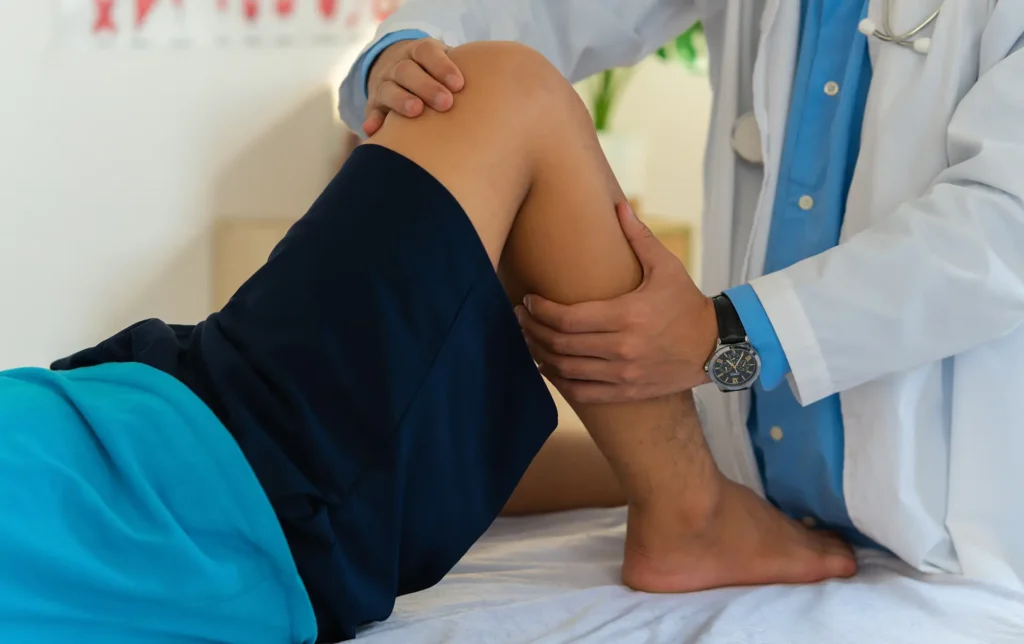For many people with chronic knee pain, the thought of undergoing total knee replacement surgery can feel overwhelming. If you’re in the same situation, you might hesitate seeking treatment due to concerns about pain and a long recovery.
Fortunately, Enhanced Recovery After Surgery (ERAS) is changing the way people recover from knee replacement surgery. In this article, we explain how this approach to knee replacement can make your experience less intimidating and more effective.
Why Some Patients Delay Knee Replacement Surgery
Many patients are reluctant to undergo total knee replacement surgery due to fear; fear of intense post-surgical pain, extended hospital stays, and a slow, difficult recovery. These concerns are valid, though they may be based on stories from friends or relatives who underwent traditional knee replacement procedures years ago.
What many don’t realise is that untreated knee problems often lead to a lower quality of life in the long-run. Chronic knee pain can:
- Make walking or climbing stairs a daily struggle
- Disrupt your sleep, so you wake up tired and irritable
- Prevent you from enjoying hobbies or family activities
- Contribute to anxiety or depression due to reduced independence
Living with persistent knee pain doesn’t have to be your “new normal.” With the ERAS approach, you can improve the functionality of your knee while reducing the pain associated with traditional knee replacement procedures.
What Is ERAS (Enhanced Recovery After Surgery)?
ERAS is a multimodal care pathway designed to improve the surgical experience for patients. Unlike traditional methods that focus mainly on the procedure itself, ERAS takes a holistic, evidence-based method that supports patients before, during, and after surgery.
Key components of the ERAS protocol include:
- Pre-operative education to prepare you mentally and physically for surgery
- Optimised pain control with fewer opioids and more targeted pain relief
- Early mobility, allowing you to stand and walk on the same day as your surgery
- Post-operative rehabilitation that starts early and focuses on steady progress
The goal of ERAS is to reduce surgical stress, improve outcomes, and facilitate a smoother and quicker recovery. For you, this means less time in the hospital, less post-op pain, and a faster return to everyday life.
What Recovery Looks Like at ALPS Orthopaedic
For patients undergoing knee replacement with the ERAS approach, recovery begins on the same day as your surgery. It continues with close guidance from a dedicated care team to restore your mobility and strength.
Day 0: Walking the Same Day as Surgery
With optimised pain control and minimally invasive surgical techniques, most patients are encouraged to stand and take a few steps with assistance just hours after surgery. Early mobilisation lowers the risk of complications, such as blood clots, and sets the stage for a faster recovery.
Week 1–2: Light Daily Activities and Guided Physiotherapy
During this phase, patients begin performing light daily tasks, such as walking around the house, climbing stairs, and performing simple household chores. You’ll work closely with a physiotherapist, either in the clinic or at home, to focus on gentle stretching and strengthening exercises that restore your range of motion and support a safe return to activity.
Week 4 and Beyond: Longer Walks, Social Outings, and Advanced Rehab
As healing progresses, physiotherapy becomes more intensive. You’ll gradually increase your walking distance, build strength in your leg muscles, and begin balance training. Most patients are able to return to social and family outings by this time and find it easier to move through daily life without the pain and stiffness they had before surgery.
The consistent support from your surgeon and physiotherapy team ensures that each stage of your recovery is guided, goal-oriented, and adapted to your needs.
Is It Time to Consider Knee Replacement Surgery?
Knee pain can creep in gradually, but when it begins to limit your life, it might be time to explore your options. Here are some signs that total knee replacement may be worth considering:
- Knee pain disrupts your sleep
- You struggle to walk, climb stairs, or stand for extended periods
- Pain and stiffness prevent you from enjoying life or achieving your goals
- Non-surgical treatments (medication, physiotherapy) are no longer effective
Speak with a Specialist Who Understands Your Needs
If you’ve been living with knee pain and putting off total knee replacement surgery because of fear or uncertainty, know that your concerns are completely natural. But taking the first step doesn’t mean committing to surgery, it simply means learning more about your options.
At ALPS Orthopaedic, we take the time to understand your needs, goals, and lifestyle so we can recommend the right path forward, whether that’s surgery or a different form of treatment.
When you’re ready, we’re here to help you walk with ease, move with confidence, and return to the life you’ve been missing. Book a consultation with us.

